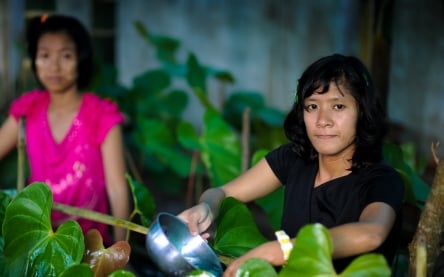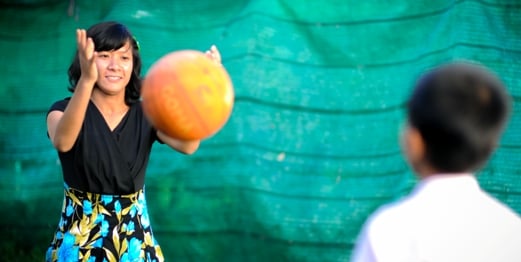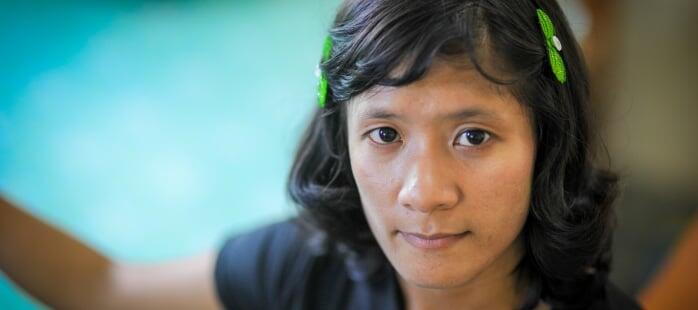YANGON, Myanmar - For years, 19-year-old Chan Chan was isolated by a stigmatizing secret: She is HIV-positive. The disease is a taboo subject in Myanmar, where she lives. As a result, many people decline to get tested, or receive treatment much later than they should. Many, like Chan Chan, struggle to find care and live in fear of discrimination.
But today, with help from UNFPA, Chan Chan is a youth activist, advocating for the rights of other young people living with HIV.
"My dream is big," she said. "I want to change the people’s perspective on HIV and AIDS."
For years, 19-year-old Chan Chan was isolated by a stigmatizing secret: She is HIV-positive. The disease is a taboo subject in Myanmar, where she lives. As a result, many people decline to get tested, or receive treatment much later than they should. Many, like Chan Chan, struggle to find care and live in fear of discrimination.
But today, with help from UNFPA, Chan Chan is a youth activist, advocating for the rights of other young people living with HIV.
"My dream is big," she said. "I want to change the people’s perspective on HIV and AIDS."
- See more at: https://asiapacific.unfpa.org/public/Contracting_HIV_put_my_life_in_per…

Growing up with HIV
At the age of nine, Chan Chan contracted HIV from a used syringe at a clinic in her home village of Tha Byu Chaing, in Myanmar’s Rakhine State.
“Whenever I got sick, we had to go and see the village medical officer. At that time, people in my village did not know much about HIV. At the medical clinic, syringes were often reused due to a lack of education or knowledge about the dangers of contagion,” she said.
In Myanmar, rough estimates indicate 215,000 people are living with HIV, but the figure is widely believed to be much higher – and it is expected to rise as the population becomes more mobile.
Growing up with HIV was difficult. Chan Chan’s family struggled to afford the anti-retroviral therapy (ART) she needed. At times, she had to forgo her medication entirely.
“On the radio I had heard that HIV/AIDS was a deadly disease. I was sure that I was going to die from it,” she said. “However my mother assured me that as long as she was alive, she would never let that happen.”
As Chan Chan grew older, it became increasingly difficult to obtain ART in her hometown. In 2011, she and her mother moved to Yangon in search of HIV services.
They contacted Phoenix, one of the few local networks for people living with HIV. Much to their relief, they learned about Pearl Metta, an orphanage on the outskirts of Yangon where children with HIV could receive ART free of charge.
Learning to live - and dream
Chan Chan has since become a young activist, working on behalf of other young people affected by the illness.
In 2013, she joined the Myanmar Youth Star Network, a programme for young people living with HIV. Through the Network, she underwent training on how to become a peer-educator for youth living with the disease. Now, at Pearl Metta, she helps children with their schooling, and she provides counselling to those who need it.

Still, she continues to face challenges due to her HIV status. Because she often fell ill, Chan Chan was forced to drop out of school after the ninth grade.
But she refuses to be discouraged.
"Despite my illness, I want to go to university and become an educated person so that I can help others,” she said. “I did not give up my life when I found out I had HIV, and I strongly believe that there is no reason to give up on your hopes just because you are living with the disease.”
“Also I do not think of myself as the only one living with HIV. I keep telling myself that I can do it and I live each day thinking what is next and what I should achieve next."
Empowering people living with HIV
UNFPA works with governments, partners and activists to prevent the spread of HIV and to assist and empower those living with the illness. UNFPA contributes $5.8 million to the Myanmar HIV and AIDS country programme, and covers one third of the country’s need for contraception, including with the distribution of condoms, which can prevent the spread of HIV.
UNFPA also supported a youth leadership training organized by the Myanmar Youth Star Network in September of last year. Chan Chan was selected to attend the event. She says she is committed to helping expand HIV services in her community, and to ending the stigma and discrimination confronting people living with HIV.

“Discrimination towards HIV-affected persons is still there. I want to educate the people in my community through the health, education and behavior-change communication sessions. And most of all, I hope everyone in my community can have access to free ART and blood-testing services,” she said.
She finds strength in having endured, and overcome, the struggles of her childhood. “I can be somebody who can help people around me in so many ways, even though I was once discouraged, discriminated against, and looked down upon simply because I have HIV,” she said. “I want to be their voice.”
– Malene Arboe-Rasmussen


